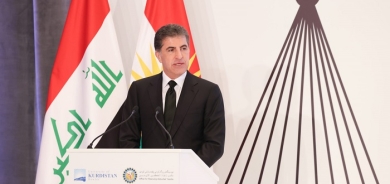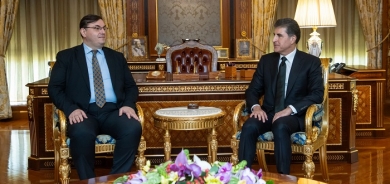Turkey Turns to Iraq's Kurds for Gas Amid Pressure From Putin

Turkey plans to build a pipeline to import gas from the Kurdistan Regional Government in northern Iraq, part of efforts to diversify its energy supply as relations with Russian President Vladimir Putin deteriorate.
The state-run gas grid operator Botas will open a tender in two months for construction of the 180-kilometer (112-mile) pipeline, which will carry up to 20 billion cubic meters of gas a year from the border with Iraq to where the existing grid ends at Mardin, a Turkish official said Wednesday, asking not to be named in line with policy.
Turkish officials have scrambled to secure alternative sources of energy since its F-16s downed a Russian warplane in the border region with Syria, triggering economic sanctions and intensifying verbal attacks from Putin. Though Russia has promised to adhere to its contractual supply obligations, the incident has left Turkey exposed.
“In the long-term, Turkey needs to cut its dependence on Russian gas below 30 percent, from 55 percent now, and it also needs to speed up work on getting Kurdish gas,” Mehmet Ogutcu, chairman of London-based energy advisory firm Global Resources Partnership, said by phone on Wednesday. “Those occupying ruling positions in Turkey should stop promulgating the narrative that it can get gas from other sources -- it’s not that easy.”
Turkey’s $800 billion economy relies on imports for almost all of its fossil fuel needs, with half of its natural gas coming from Russia at a cost of as much as $10 billion last year.
Istanbul, Turkey’s most populous city that accounts for more than a quarter of national output, is almost entirely dependent on Russian gas imports through the Trans-Balkan pipeline, according to the Turkish official. Storage facilities around the city may not be sufficient to meet demand in the case of a prolonged cut in supply, he said.
‘Dependent’
“On energy, Turkey is definitely more dependent on Russia than what the consensus seems to portray,” Naz Masraff, director for Europe at political risk consultants Eurasia Group, said on Monday. “If there were to be technical problems on the Trans-Balkan line for one or two days, that would really make Turkey and especially the Istanbul region struggle both in terms of power cuts, gas cuts, heating and production.”
The value of Turkey’s business makes it unlikely that Putin will break Russia’s deals to supply gas, according to Emin Danis, energy program coordinator at Istanbul-based Caspian Strategy Institute.
“I don’t expect Russia to take a step that would put Turkey’s supply security at risk unless the tensions between the two countries escalate dramatically,” Danis said in an e-mail.
While Turkey doesn’t expect Putin to resort to that route, the nation “must be prepared for the worst case scenario,” Prime Minister Ahmet Davutoglu said Tuesday. He traveled on Thursday to Azerbaijan, where he is expected to ask for increased gas supplies, a day after President Recep Tayyip Erdogan reached a preliminary agreement to import liquefied natural gas, or LNG, from Qatar. Erdogan is scheduled to visit Turkmenistan, another gas exporter, next week.
The pipeline to northern Iraq would further a relationship with Iraq’s Kurds that has improved in recent years, in contrast to the collapse of a ceasefire with autonomy-seeking Kurds in Turkey earlier this year. Turkey offers the sole route to market to the expanding Kurdish oil industry, and Turkish companies provide builders and consumer goods.
Bloomberg















